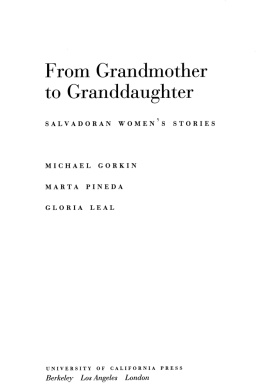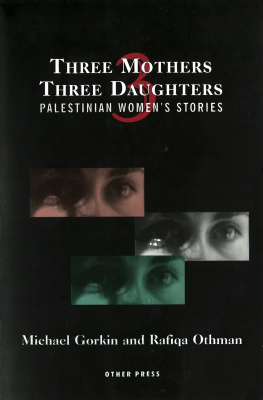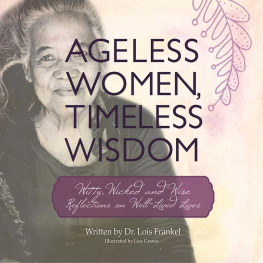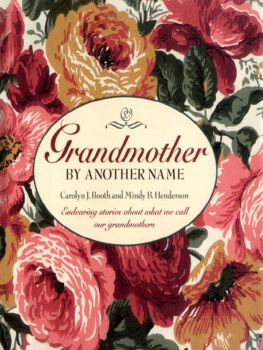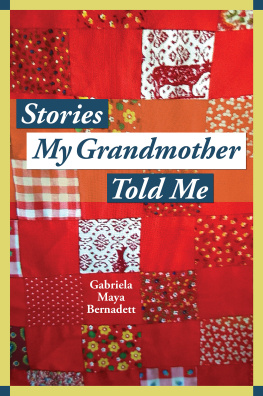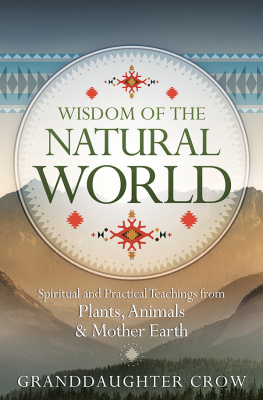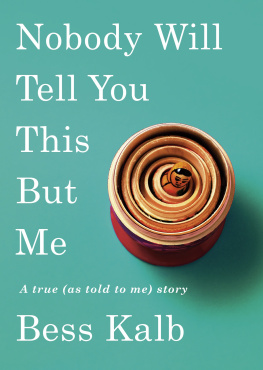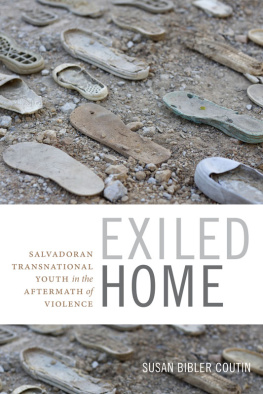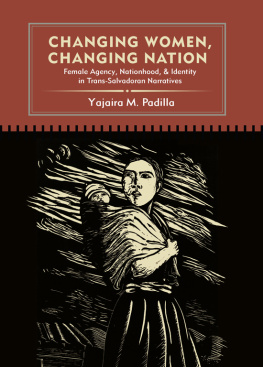Michael Gorkin - From Grandmother to Granddaughter: Salvadoran Women’s Stories
Here you can read online Michael Gorkin - From Grandmother to Granddaughter: Salvadoran Women’s Stories full text of the book (entire story) in english for free. Download pdf and epub, get meaning, cover and reviews about this ebook. publisher: University of California Press, genre: Home and family. Description of the work, (preface) as well as reviews are available. Best literature library LitArk.com created for fans of good reading and offers a wide selection of genres:
Romance novel
Science fiction
Adventure
Detective
Science
History
Home and family
Prose
Art
Politics
Computer
Non-fiction
Religion
Business
Children
Humor
Choose a favorite category and find really read worthwhile books. Enjoy immersion in the world of imagination, feel the emotions of the characters or learn something new for yourself, make an fascinating discovery.
- Book:From Grandmother to Granddaughter: Salvadoran Women’s Stories
- Author:
- Publisher:University of California Press
- Genre:
- Rating:5 / 5
- Favourites:Add to favourites
- Your mark:
- 100
- 1
- 2
- 3
- 4
- 5
From Grandmother to Granddaughter: Salvadoran Women’s Stories: summary, description and annotation
We offer to read an annotation, description, summary or preface (depends on what the author of the book "From Grandmother to Granddaughter: Salvadoran Women’s Stories" wrote himself). If you haven't found the necessary information about the book — write in the comments, we will try to find it.
From Grandmother to Granddaughter: Salvadoran Women’s Stories — read online for free the complete book (whole text) full work
Below is the text of the book, divided by pages. System saving the place of the last page read, allows you to conveniently read the book "From Grandmother to Granddaughter: Salvadoran Women’s Stories" online for free, without having to search again every time where you left off. Put a bookmark, and you can go to the page where you finished reading at any time.
Font size:
Interval:
Bookmark:

From Grandmother to
Granddaughter
From Grandmother
to Granddaughter
SALVADORAN WOMENS STORIES
MICHAEL GORKIN
MARTA PINEDA
GLORIA LEAL

UNIVERSITY OF CALIFORNIA PRESS
BerkeleyLos AngelesLondon
University of California Press
Berkeley and Los Angeles, California
University of California Press, Ltd.
London, England
2000 by Michael Gorkin
Library of Congress Cataloging-in-Publication Data
Gorkin, Michael.
From grandmother to granddaughter : Salvadoran womens stories / Michael Gorkin, Marta Pineda, and Gloria Leal.
p. cm.
ISBN 978-0-520-22240-3 (pbk.: alk. paper)
eISBN 9780520924505
1. El SalvadorHistory20th century.2. WomenEl SalvadorSocial conditions20th century.3. Oral history.I. Pineda, Marta.II. Leal, Gloria.III. Title.
F1488 .G67 2000
972.84052dc2199-049789
Manufactured in the United States of America
15 14 13 12 11 10 09
11 10 9 8 7 6 5 4 3
The paper used in this publication meets the minimum requirements of ANSI/NISO Z39.48-1992 (R 1997) ( Permanence of Paper ).
For our children, Talya, Maya, Josemara, Wendy, Natalie
Contents

El Salvador
Acknowledgments
We are deeply thankful, above all, to the nine women who agreed to share with us their time and their stories, and who have made it possible to write this book. Though none of them appear here in their own names, we hope we have made clear to them privately the fullness of our gratitude.
In addition, there were many Salvadorans who gave us help and encouragement in producing this book, and we wish to thank them warmly: Marta Alicia Castro, Carlos Romeo Domnguez, David Escobar Galindo, Luis Gonzalez, Daniel Guttfreund, Julia de Leal, Ricardo Leal, Rmulo Leal, Marta Eugenia de Luna, Amparo Marroqun, Julia de Mendoza, Pedro Mendoza, Roxana Vides.
To the Fulbright Scholar Program that made it possible for Michael Gorkin to come to El Salvador, and to TACA Airlines that provided much of the transportation, we also extend our appreciation.
And finally, to the fine and friendly staff at the University of California PressLynne Withey, Edith Gladstone, Sue Heinemann, and Ina Clausenwe are thankful for helping us do this book as we wanted and hoped.
Introduction
BY MICHAEL GORKIN
For the second time in three years I find myself writing a book about women. I have asked myself repeatedly (as psychologists are wont to do) why my work has taken this particular direction. And I am now convinced that the two main reasons are the two individuals I name in the dedication to this bookmy daughters, Talya and Maya. In short, the process of becoming and being a father to two girls seems to have moved me to the point where womens lives and writing about women have become an absorbing interest. Call it feminism, I guess; and while I absolve them of any blame for the opinions expressed here, I consider Talya and Maya basically and blessedly responsible for the fact that I am involved in writing this book at all.
Why, then, write about Salvadoran women? The answer goes back to a serendipitous trip I made shortly after finishing the book on Palestinian women. In the spring of 1996 I was invited to give some lectures to the staff of the Student Counseling Services of Universidad Doctor Jos Matas Delgado in El Salvador. Never having been to El Salvador, I was curious and decided to go. In the obscure and magical way these things sometimes happen, I felt drawn to the country. By the time I left three weeks later, I already had in mind the possibility of doing a book about Salvadoran women and of collaborating with several women, colleagues Id met on the counseling staff.
For me, part of the appeal of doing such a book was that El Salvador in some ways resembled the society and country about which I had just writtenPalestine. Here too, I discovered, male dominance ( machismo ) was not only a pervasive pattern but was undergoing a serious challenge from increasing numbers of women. Moreover, as in Palestine, there had been a recent upheavalthe civil war that lasted from 1980 to 1992. To what extent, I wondered, had this war affected the role and perception of women in Salvadoran society?
Alongside the similarities, one marked difference between the two countries immediately struck me: the significance of social class. In Palestine the common struggle against Israel mutes class differences, but in El Salvador these differences are sharp and obvious. I began wondering how much solidarityor if not solidarity, then a feeling of similaritythese class barriers allow Salvadoran women to experience.
Apart from these intriguing comparisons and contrasts between Palestinian and Salvadoran society, there was the challenge of once again trying to write a book on women, and with women (on some of the difficulties that face a man who wishes to do this kind of work, see my comments below). And the opportunity to gather and convey womens life stories in a meaningful waydespite the obstacles, both personal and technicalwas one I found irresistible.

M y next step was to contact possible coauthor(s). I had no interest in trying to do the book alone. I spoke enough Spanish para defenderme (to defend myselfto get along, in other words) and to conduct interviews but lacked a deeper understanding of the language and its subtleties. Even more crucial, as a man I could not alone meet or interview the majority of the women in the study. Hence, I turned to Marta Pineda and Gloria Leal, both psychologists, and asked if they would be willing to coauthor the book with me. Neither had been involved in gathering oral narratives, but with a mixture of enthusiasm and hesitation, they agreed. Their experience as psychologists made it likely that both might be skillful interviewersand so they were, even beyond all our expectations.
As the title of this book suggests, we decided to write about families. Specifically, we settled on three families, and our subjects are a trio of grandmother-mother-granddaughter from each family. In writing about Palestinian mother-daughter pairs I took a similar approach. This time, I thought the addition of another generation might enhance the collective portrait of the families and the society. No doubt, part of myand my colleaguesinclination to choose families as our focus reflects the fact that we are psychologists. Thus, the interplay of family members has a special attraction for us. But beyond that, the focus on multigenerational families allows us to see how changes occur over time in each family and perhaps, by implication, in the society at large. Moreover, as oral historians are well aware, there is a subjective element to all storytelling. The focus on families, with each member bringing her own slant on one event or another, has the advantage of underscoring this subjectivity. Because I have worked in Arab and Latin cultures, I am now inclined to find a more poignant reality precisely in this so-called subjectivity.
For various reasons, then, the three of us were drawn to focus on families as our subjects. The question was, which families? We picked social class as the most significant criterion. More than any other factor except gender, social class differentiates among individuals. To be sure, these social classes are not equally represented in Salvadoran society. About 65 to 70 percent of Salvadorans belong to the lower class, with the middle class making up 20 to 25 percent, and the upper class 5 to 10 percent. Yet despite the disproportionate percentages, this criterion provides a wide and varied picture of Salvadoran womens experiences and, by extension, a sense of Salvadoran society as a whole.
Next pageFont size:
Interval:
Bookmark:
Similar books «From Grandmother to Granddaughter: Salvadoran Women’s Stories»
Look at similar books to From Grandmother to Granddaughter: Salvadoran Women’s Stories. We have selected literature similar in name and meaning in the hope of providing readers with more options to find new, interesting, not yet read works.
Discussion, reviews of the book From Grandmother to Granddaughter: Salvadoran Women’s Stories and just readers' own opinions. Leave your comments, write what you think about the work, its meaning or the main characters. Specify what exactly you liked and what you didn't like, and why you think so.

